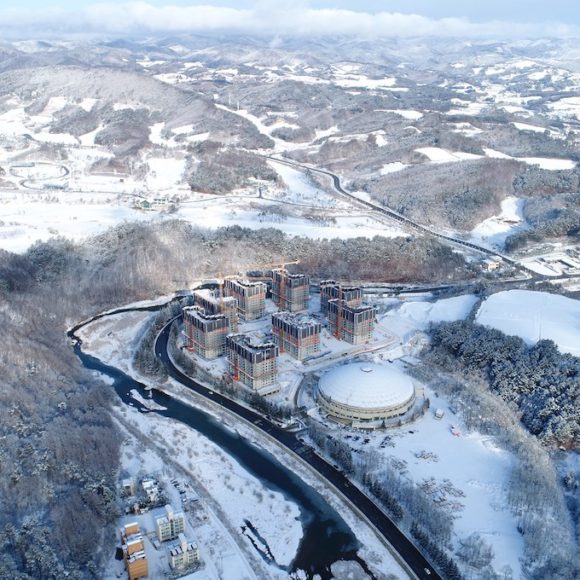If South Korea’s Winter Olympics go off without a hitch this month, organizers will not be alone in toasting success. Their insurers will also be celebrating a tidy profit.
The Games are being staged about two hours’ drive from one of the world’s most heavily militarized borders, in a host country that is technically at war with its neighbor and with teams that include two nations — the United States and North Korea — which have swapped nuclear threats.
There are also concerns among Olympic organizers and sponsors that the Games, at the ski resort of Pyeongchang, could become a target of cyber hacking, a threat that could disrupt competition in the event of a major cyber attack.
The International Olympic Committee (IOC) takes out protection for around $800 million at each Games, which covers the vast majority of the roughly $1 billion investment it makes in each of the host cities.
The policy will pay out for a range of mishaps, ranging up to declarations of war, actual war, or acts of war.
An IOC spokesperson said it was in constant contact with the South Korean government about the security situation.
“We have been informed that the position of the South Korean government with regard to security at the Olympic Winter Games Pyeongchang 2018 has not changed,” the spokesperson said.
The IOC declined to reveal the premium it has paid for the Pyeongchang, but insurers said it was likely to be around 2-3 percent of the total cover.
At the IOC’s coverage of about $800 million, this would represent a cost of around $16-24 million. One underwriter said this would be relatively high and could reflect the greater security risks surrounding the Pyeongchang event.
At the summer Games at Rio de Janeiro in 2016, when worries were centered on an outbreak of Zika virus, and at London in 2012, the IOC paid premiums of about $13 million. At Beijing in 2008, it paid just over $4.0 million for the same coverage.
In terms of corruption, theft or violent crime — which bedeviled the Rio Olympics — South Korea is a relatively safe country to host the Olympics, says research firm IHS Markit.
“If you didn’t have North Korea, there would be very little to discuss,” said Duncan Fraser, senior partner at insurance broker JLT Sport Media and Entertainment.
He said not all war scenarios would be covered.
“If there is a war involving one of the five major powers, it is unlikely to be covered by an insurance policy, but if it just happens to be a war between North Korea and South Korea, without any sort of involvement of the U.S. or China or Russia, you might have cover there,” Fraser said.
CYBER SECURITY
As organizers prepare to stage the opening ceremony on Friday, political tensions surrounding the event are evident, despite South Korean President Moon Jae-in’s efforts to use the Games as a way to re-engage with the North.
A team from North Korea is competing, and two of the reclusive nation’s most senior officials, including leader Kim Jong Un’s younger sister, will be among the VIP guests for the opening. U.S. Vice President Mike Pence will also be there, two days after he vowed tough new sanctions against the North.
Japanese Prime Minister Shinzo Abe, who met Pence on Wednesday and agreed they could “never accept” a nuclear-armed North Korea, is also among some 20 heads of state and top political leaders to attend the Games.
Olympics sponsors as well as hoteliers, merchandisers, car hire firms and travel companies also typically buy insurance.
Switzerland’s Swatch Group, which owns Omega, the official timekeeper of the Games, said it had taken out “several insurance contracts” as normal, a spokeswoman said.
Discovery Communications, which owns European broadcaster Eurosport and is a first-time Olympics broadcaster, is insured against cyber attacks, said Dave Schafer, senior vice president for Olympics operations at the firm.
“We’ve taken a lot of measures around cyber security,” he said. “We feel very secure. But there can always be an issue.”
Comcast Corp., whose NBC Sports will broadcast the Games in the United States, said in its 2016 annual report that increasing data security breaches meant its insurance policies in general “likely would not be sufficient to cover our losses.”
NBC Sports declined to comment.
Olympics organizers and contractors rely on many insurers and types of coverage. Firms worried about event cancellation buy so-called contingency insurance against loss of revenue.
Political risk is offered as a standalone policy or an add-on to property insurance to cover disruption from terrorism or war. These policies typically also include accident and health cover.
Adam Posner, senior underwriter for crisis management, North America, at Allianz, said the insurer had seen more enquiries for political risk insurance for the Games.
Those concerned about an online attack, including by nation states, buy cyber policies, with broadcasters also able to buy cover against transmission failure.
Still, some insurers are wary of covering these Games.
Lloyd’s of London insurer Talbot Underwriting Services, which has covered past Games, decided against underwriting Pyeongchang after weighing up the risks against the premium it could fetch.
“A number of enquiries came to Talbot for this year’s Winter Olympics, but we were unable to match our assessment of the exposure with the pricing,” said Alan Norris, Head of Contingency at Talbot.
(Additional reporting by Karolos Grohmann and Liana Baker in Pyeongchang and Silke Koltrowitz in Zurich; Editing by Mark Bendeich)
Was this article valuable?
Here are more articles you may enjoy.



 Trump’s EPA Rollbacks Will Reverberate for ‘Decades’
Trump’s EPA Rollbacks Will Reverberate for ‘Decades’  Florida Engineers: Winds Under 110 mph Simply Do Not Damage Concrete Tiles
Florida Engineers: Winds Under 110 mph Simply Do Not Damage Concrete Tiles  World’s Growing Civil Unrest Has an Insurance Sting
World’s Growing Civil Unrest Has an Insurance Sting  Gun Accessory Company to Pay $1.75 Million to Buffalo Supermarket Shooting Victims
Gun Accessory Company to Pay $1.75 Million to Buffalo Supermarket Shooting Victims 

